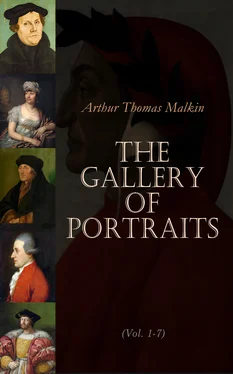At the surprise of Réde, at the siege of Villefranche, at the taking of Eause and Cahors, at the battle of Marmande, and in all the dangerous affairs in which Henry engaged, Rosny was always at his side. His good services, and the affection borne him by his master, did not, however, prevent a quarrel, which, it must be said, was provoked by his own imprudence and aggravated by his own pride. In spite of the commands of the Prince of Navarre, who had wisely prohibited the practice of referring private quarrels to the arbitrement of the sword, Rosny acted as second in a duel, in which one of the principals was desperately wounded. The Prince’s anger at the breach of discipline was exasperated by a strong personal regard for the wounded man. He sent for Sully, rebuked him in harsh terms, and said that he deserved to lose his head for what he had done. The pride of the young soldier was touched; he replied that he was neither vassal nor subject of Navarre, and would henceforth seek the service of a more grateful master. The Prince rejoined in severe terms and turned his back on him; and Rosny was quitting the court, when the Queen, who knew his value, interfered, and reconciled him with her son.
Not long after he quitted Henry’s service, alleging that he had pledged his word to accompany the Duc d’Alençon, afterwards Duc d’Anjou, brother of Henry III., in his contest for the sovereignty of Flanders; where, in case of success, he was to be put in possession of the estates which had belonged to his maternal grandfather. In this campaign he gained neither honour nor profit, and soon returned to his original master. Henry received him with open arms, and, as if to prove that absence had not affected his confidence and esteem, sent him a few days after on an important mission to Paris.
In the troubled times which followed, Rosny was unshaken in devotion to the cause which he had espoused. He accompanied Henry, when that prince, with only nineteen followers, threw himself, as a last resource, into La Rochelle. He undertook an embassy from that city to Henry III., then almost as much persecuted by the League as the King of Navarre himself. In his Memoirs he has left a striking description of the degraded condition of that sovereign, who had entirely abandoned himself to favourites and menials of the court. “His Majesty was in his cabinet; he had his sword by his side, a hood thrown over his shoulders, a little bonnet on his head, and a basket full of little dogs hung round his neck by a broad riband.” He listened to Rosny with vacant stupidity, neither moving his feet, his hands, nor his head. When he spoke, he complained of the audacity and insults of the League—said that nothing would go well in France until the King of Navarre went to mass—but agreed, finally, that Rosny might treat with the envoys of the Protestant Cantons of Switzerland, in his name as well as the King of Navarre’s, for the raising of twenty thousand Swiss troops, to be employed between the two sovereigns.
Henry, through his imprudence, lost all the advantages which his faithful servant’s treaty with the Swiss might have secured to him; but neither disgusted nor dispirited by this folly, Rosny persevered in his attachment to a cause which seemed altogether desperate to most others. He was at the siege of Fontenay, and at the brilliant victory of Coutras, for which the King of Navarre was materially indebted to the artillery under Rosny’s command. His next great undertaking was to effect an entire reconciliation between his master and the King of France. Having succeeded in this, the eyes of all France thenceforward rested upon him as the only man who could re-establish the distracted kingdom. Such was the enthusiasm of many of the French at the time, that they called him “Le Dieu Rosny.”
The desired reconciliation had not long been made when Henry III. was assassinated by a fanatic monk, and the King of Navarre laid claim to the vacant throne. But much remained to be done ere he could tranquilly seat himself upon it. His religion was an insurmountable obstacle to the mass of the nation, and the League was all-powerful in many parts of France and held possession of Paris.
Rosny fought with his accustomed valour at the battles of Arques and Ivry. At the latter he well nigh lost his life: he received five wounds, had two horses killed under him, and fell at last among a heap of slain. The manner in which he retired from this field, with four prisoners of the highest distinction and the standard of the enemy’s commander-in-chief, is one of the most romantic incidents to be found in authentic history.
After the victory of Ivry, Rosny did not receive the rewards he merited, and he remained for some time at his estate under pretence of ill health, but secretly disinclined to return to the service of one who had shown little real gratitude for his long and faithful adherence. No sooner, however, did he learn that Henry was about to undertake the siege of Paris, than he left his retreat and hastened again to his master’s side. His wounds were still uncured: he appeared before the King leaning on crutches and with an arm in a sling. Touched by his devotedness and his melancholy state, Henry loaded him with caresses, and insisted that he should not expose himself for the present but remain near his person to assist him with his counsels.
When Henry first meditated his recantation of the Protestant faith, he consulted Rosny on this all-important subject. The honest soldier after reviewing the state of the parties opposed to the King, and holding out the hope that they would disagree among themselves and fall to pieces, said, “With regard to your change of religion, it cannot be otherwise than advantageous to you, seeing that your enemies have no other pretext for their hostility, but, sire, it is between you and your conscience to decide on this important article [4].” Shortly after this conversation the death of the Duke of Parma relieved Henry from one of his most formidable enemies; but the implacable Leaguers, now becoming meanly desperate, laid plots against his life, and, it is said, even sent assassins to Mantes, where the King was residing. Henry thought to provide for his personal safety by continually surrounding himself by a corps of faithful English soldiers who were in his service; but Rosny, knowing the craft and audacity of fanaticism, and warned of the danger which menaced the competitor for the crown by the untimely fate of its last wearer, was kept in a state of continual alarm. At last, sinking his attachment to the reformed religion in his attachment to his King and his friend, he supplicated, on his knees, that he would conform to the doctrines of the Roman Catholic Church. And this the King did almost immediately after. Rosny continued a Protestant. Many of the cities of France now submitted to Henry, but Rouen, one of the most important of the number, was only gained over by the skilful negotiations of Rosny, who shortly after treated, and with equal success, with the Duke de Bouillon, the Duke de Guise, and other formidable enemies of the King. In return for these valuable services, he was admitted into the Councils of War and Finance, where his honesty and the favour of his master soon roused the corrupt and jealous members of those departments of government against him. So great, indeed, were his annoyances that in the absence of Henry he withdrew again to his estates, and was only induced to return to his post by a personal visit from his sovereign.
The King, who was now strong enough to attack the Spaniards in their dominions in the Low Countries, laid siege to Arras: but through the bad conduct of those who administered the finances of the state, he not only found himself unprovided with all that was necessary to prosecute his undertaking with success, but was left in a state of entire and even personal destitution. In these difficulties he called Rosny to his assistance, and placed him at the head of the finances. Under the new minister’s able and honest management, affairs soon changed their aspect: the treasury was replenished, while at the same time the people found their burdens lightened by economy. Rosny had prepared himself for this office, in the discharge of which he became a true benefactor of France, by a profound study of accounts and of the revenues and resources of the country; and when the post was given to him, for a considerable time he laboured night and day to detect the impolicy and the peculation of those who preceded him, and to re-establish the finances of the country.
Читать дальше












